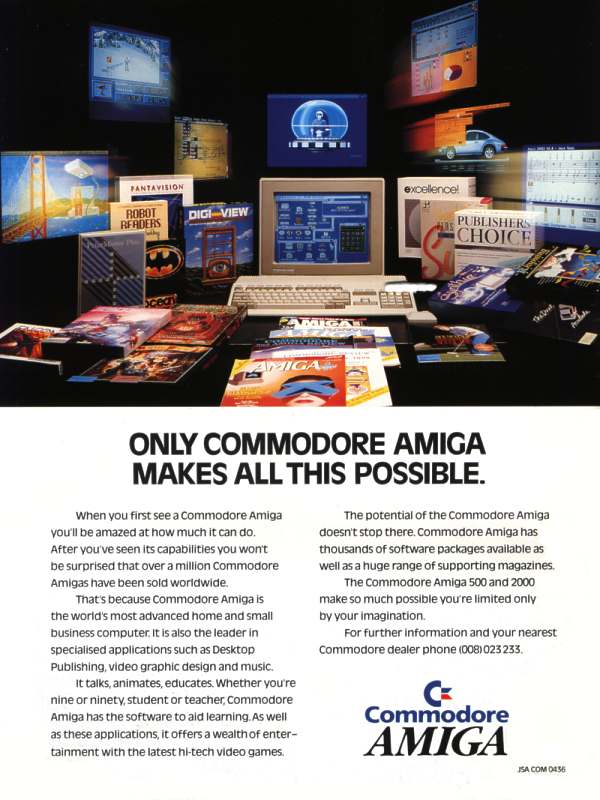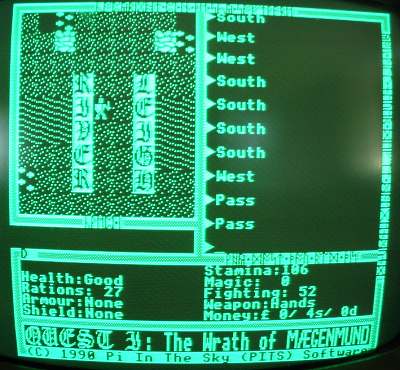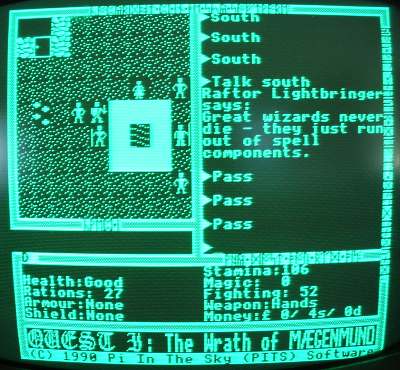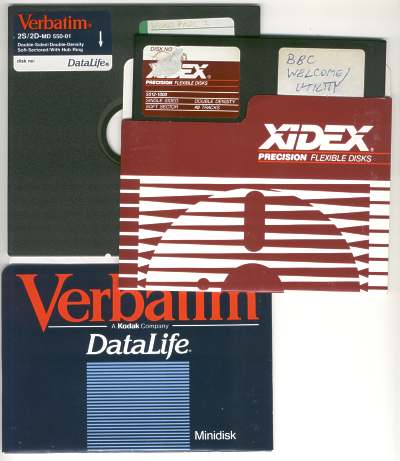I’m preparing to move house, and during the inevitable clearout of old stuff, found a magazine from 1989 with this advert:

I had an Amiga 1200 for a while in the 90s. Lots of fun.

I’m preparing to move house, and during the inevitable clearout of old stuff, found a magazine from 1989 with this advert:

I had an Amiga 1200 for a while in the 90s. Lots of fun.
It’s probably the type of anniversary that can be most easily missed without dire consequences, but I just realised that as of the 1st of this month, Geekrant.org was a year old. Thanks to my co-conspirators and (some only occasional, alas) contributors Tony, Josh, Andy and Brian.
Traffic has continued to climb, so obviously somebody’s reading, even if it does seem to be mostly a handful of regulars who keep commenting.
And if you’re wondering, the biggest hitting entry is the one with those pictures of Bill Gates.
Well, I sorted out my problem of confusing warnings appearing whilst controlling Excel with VBA. Turns out there is an Application.DisplayAlerts property which, when set to false, hides warnings such as the one I was getting. It took a little Googling to find the solution, which wasn’t readily apparently in any of the MS help for the methods I’d got the warnings from.
The other Office applications also have a DisplayAlerts property.
Okay, this is annoying. I’m working on a VB program that uses the Excel object library to automate a fairly complex update into Excel. The general idea when you’re automating Excel is to smoothly do your operation behind-the-scenes, to hide the complexity from the user.

So the last thing you need is complicated dialog boxes popping up to ask the user questions. I’m the programmer: I’m meant to make the decisions. Tell me, the programmer, that if I save this Shared Workbook with a password that certain parts of the file won’t be encrypted. Don’t tell my user, and ask them to decide if it should happen or not.
Video iPod and iTunes 6 announced by Apple. (via Tony)
When I was 17 or so (year 11, 1987), I had spurned my Commodore 64 in favour of a BBC B micro. At the end of year 11, some of the departing year 12s gave me the code to a little project they’d been working on: a clone of Ultima for the Beeb. It was really just the core of such a game: the display routine for moving about the map, obscuring objects out of view (such as behind walls), and showing monsters.
At a time when I should have been out pursuing girls, this caught my imagination (I’d played a LOT of Ultima in my time), so I took the code and expanded it. A friend who was into role playing games wrote a basic story for it. Another friend supplied some music for the title screen.
I re-wrote the main display routine in 6502 assembly language for speed, and added maps, extra characters to talk to, weapons and fighting. “Quest I: The Wrath of Mægenmund” (egads, it sounds like something out of Spinal Tap) wasn’t anything special, and was never finished, but it was pretty cool.

It ran in the Beeb’s graphics mode 4, so it was monochrome, 320×256 pixels, I think. It used a lot of loading in and out from the disk, with a main (outdoor) map, and lots of separate maps for dungeons, towns and villages. There was no sound to speak of, but there was a lot to explore. You could buy drinks from bartenders (to gain strength), talk to the villagers, buy weapons and supplies, then go out and fight monsters to get more treasure. The money was measured in pounds, shillings and pence, and the language and fonts of the characters and the interface was a wacky mix of olde English, gothic script and runes.

I kept working on it for a couple of years after high school (the Beeb saw me through part of university, until an IBM PC arrived in our house), but it fizzled out in 1990, when other interests overtook it.
Windows 2000/XP’s “Set program access and defaults” appears to treat the defaults as identical for all users, and doesn’t allow non-Admin users to change it. So while it’s happy that I use Outlook 2003 for my email, I can’t convince it that when my kids logon to the same machine, they’ll use the simpler Outlook Express.
RSS (and Atom, etc) feeds haven’t hit the mainstream non-geek community yet, but they seem destined to be the Next Big Thing, with it becoming easier to use in the current version of Firefox and Safari, and the next version of IE.
The Microsoft dudes are pondering how to represent feeds. And of course, inevitably whatever they come up with will eventually become the defacto standard walloping via sheer numbers of users, other established icons such as the Firefox Live Bookmark icon, and the XML and RSS buttons. It would seem that the only thing they all have in common is the orange.
Dave Winer says just use the XML icon. Not that the average person in the street knows what XML (or RSS) is, or what it means, or what it can do for them. (Then again, they may not know what HTTP or HTML are, or what they mean, but they do have an inkling it’s got something to do with web pages.)
XML and RSS markings are established on web sites, but they’re not ideal for new users, for whom an icon might work better. I’m torn between them. But I like the idea of adapting existing ideas, so I’ve come up with a few concepts, using a wider version of the Firefox Live Bookmark icon:
![]() — Hey hey, both XML and RSS. But would it be too distracting, being animated like that?
— Hey hey, both XML and RSS. But would it be too distracting, being animated like that?
Is Feed more appropriate? But what about non-English users? Does the graphic actually work? Do people recognise it?
hmmm. More thought required. And as Ed Bott points out, what happens when someone goes and clicks on one of these buttons at the moment is far from ideal. DocType? WTF?
In case you’d forgotten what 5¼ inch diskettes look like, here’s a reminder.

My kids noted: “So they really were floppy!”
I wonder what ever happened to the Xidex company? There seems to be little information on them on the web, but a few ebay sellers are selling unused disks. Verbatim are still around.
Why were the disks out? Today I set up my old BBC micro to see if it still worked, and to ponder putting it on ebay. It did work, but some of the disks reported errors. On closer inspection, some appeared to have mould or some other kind of growth on the magnetic part.
Possibly if I really had to retrieve the data, I could find someone to recover it, but there’s nothing important on them. It does serve as a reminder that every so often you should refresh your vital data from whatever media it’s stored on, onto something new.
That’s it, ladies and gentlemen, it’s over: the High Court has ruled that mod chips for video game consoles are legal. All six judges of the High Court held that widely used mod-chips are legal and that playing a game on a consumer’s machine does not constitute an illegal copy.
This effectively clarifies that using mods to get around regional coding is legal — something important to consumers of video games and with clear ramifications for DVDs.
Pirated games, of course, are illegal. But mod chips are a legitimate technology.
Fairfax/The Age has discovered podcasts, with a business and an IT cast. With RSS and everything But ohhhh… WTF is this? It only plays in a player on their web page. The RSS they’ve setup will apparently work with iTunes or iPodder, but you can’t simply save an MP3 off the site.
HINT: A podcast needs to be easily downloadable, not tied to a web page with dodgy streaming, or to podcasting software I don’t have. I should be able to Right Click/Save link as. Subscribing via RSS is all very well, but how do I know if I want to get that involved?
Oh, and Garry Barker’s an interesting writer, but he’s going to have to cast more than a 30 second intro to what his podcast will eventually be about to get me listening regularly. (Or was that just the streaming cutting out after 30 seconds? You see the problem here?!)
Rumours spread far and wide last month that iTunes Australia would start on October 3rd. Well, October 3rd has come and gone, and nothing happened. So we keep waiting.